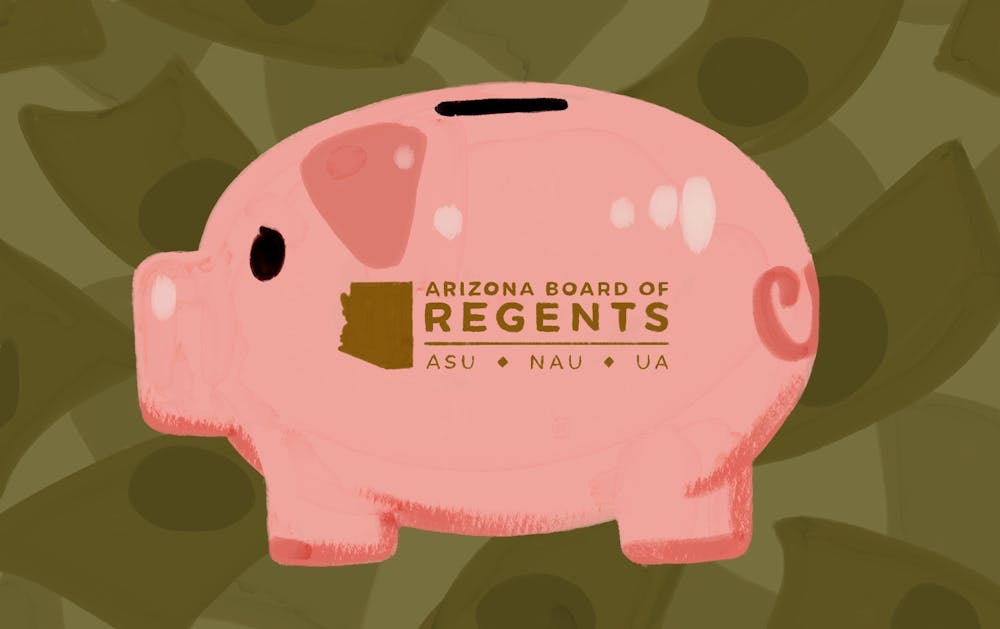The Arizona Board of Regents approved ASU's budget request for the fiscal year 2021, proposed by President Michael Crow during a special board meeting Thursday.
ASU's budget includes tuition and fee revenue along with expenditures for investing in technology, expanding faculty and providing more resources to accommodate student enrollment growth.
The University has budgeted for a net loss of $35 million, compared to a projected net increase of $6.7 million in FY20.
Morgan Olsen, executive vice president, treasurer and chief financial officer at ASU, presented the University's budget request during the meeting Thursday. Olsen said the budget reflects what the University will have to manage to accommodate the economic impact of COVID-19.
"We have an additional, sort of unique risks this year, that we have spent a lot of time focusing on and managing," Olsen said to the Regents during the meeting.
The budget presented predicts the University will generate $3.04 billion in revenue, $131.2 million more than the revenue from FY20.
According to the budget report, net tuition and fees make up 52.9%of the University's revenue.
"The largest investors in Arizona State University continue to be students and their parents," the budget proposal says.
Due to financial hardships posed by COVID-19, the report said the University did not raise tuition for on-campus students but administered a "modest increase" for online students.
The University is also anticipating a $60.5 million decrease from revenue generated by housing and dining, Sun Devil Athletics and the ASU Gammage due to COVID-19.
"It's pretty tough to hold a broadway series when no one can physically get together," Olsen joked to the Regents.
The report included allocations of the Coronavirus Aid, Relief, and Economic Security Act. A total of $48.5 million of its revenue from the act was budgeted to provide additional student scholarships and cover part of the costs used for keeping the campus clean and safe during the pandemic.
One-time funds from the CARES Act are also put toward ASU's increased financial aid expenses granted to students by the University.
READ MORE: ASU has finalized plan to distribute CARES Act money
Crow said to the Regents that ASU's budget request was not to require investment from the state to advance the University but asked for its support.
"Please help us support the students from Arizona as best you can," Crow said. "And please invest in initiatives that we're asked to undertake."
ABOR's state budget request aims to bring Arizona's economy near to what it was before the pandemic. To help reach that goal, ABOR passed a $160 million budget for FY22, including $46 million toward workforce development for ASU, $10 million to distributed learning centers and $50 million to student financial aid.
Additionally, ABOR passed an $80.51 million supplemental budget for FY21 that would make up for revenue deficits caused by the pandemic.
However, Crow said he would not accept all of the Regent's supplemental budget, which would have allocated the University a total of $35.56 million to relieve financial burdens brought by the pandemic.
Instead, Crow stated only the restoration funding of $18.9 million provided by the supplemental budget would be a part of the University's core budget request. The restoration funds would compensate for the state's proposed "skinny budget" that provided aid for Arizonans at the beginning of the pandemic.
"Our budget request is built around our ongoing desire to be a greater contribution to the state and the emergence of the new economy," Crow said to the Regents. "We believe we can operate the rest of the University and move the University forward."
As a result, an amendment was added to the supplemental budget request that would allow the presidents of NAU and UA to discuss with ABOR Executive Director John Arnold about the $16.66 million from the pandemic shortfalls that ASU will no longer be taking from the supplemental budget.
"Each institution is having a unique experience," Arnold said about redistributing the funds Crow is not accepting. "We thought it was appropriate to put those dollars back."
Reach the reporter at ekgalin1@asu.edu and follow @eringalindo29 on Twitter.
Like The State Press on Facebook and follow @statepress on Twitter.




